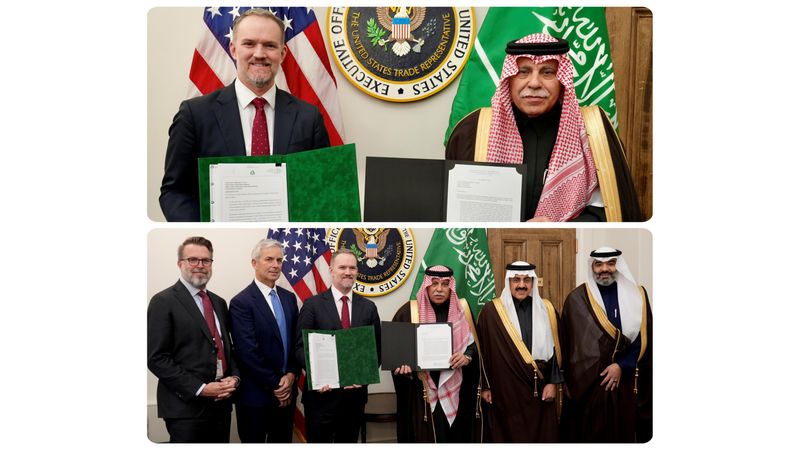What started with a dinner at the White House ended with major deals related to the Middle East this week for U.S. automakers.
General Motors CEO Mary Barra, Tesla CEO Elon Musk and Ford Motor Co.’s Executive Chair Bill Ford all attended President Donald Trump’s dinner at the White House earlier this week, according to the guest list obtained by the Detroit Free Press from the White House Press Office ― an event replete with executives from finance, technology, private equity and energy sectors.

The next day, the U.S. and Saudi Arabia signed an agreement through an exchange of letters ensuring Saudi Arabia recognizes U.S. federal motor vehicle safety standards as fully meeting its automotive safety requirements ― a move that the Detroit Three claim clears a hurdle to more U.S. auto sales in the Middle East.
And now, Stellantis is pursuing the possibility of making cars in Saudi Arabia.
The dinner, in honor of Saudi Crown Prince Mohammed bin Salman, was held on Nov. 18.
Automaker attendees of the dinner were well aware that Saudi Arabia is one of the largest car markets in the Middle East:
American Automotive Policy Council President Matt Blunt released a statement Nov. 20 celebrating the agreement with Saudi Arabia, saying the deal will expand market access for U.S. automakers in the Middle East. AAPC is a trade group representing the interests of Ford, GM and Stellantis. Stellantis owns Chrysler, Dodge, Jeep, Fiat and Maserati in the United States.
“American automakers Ford, GM and Stellantis commend the Trump Administration for solidifying the acceptance of U.S. vehicle safety standards in Saudi Arabia in an exchange of letters between the two countries,” Blunt’s statement read.
“Saudi Arabia remains an important export market for U.S. built vehicles and this type of solid commitment has long been an objective of American Automakers. We look forward to working with the administration to ensure this commitment is fully implemented and repeated in agreements to open more markets to U.S. auto exports.”
Without acceptance of U.S. standards, U.S.-made vehicles needed to be modified to meet local standards before U.S. companies can legally export them, Blunt told the Detroit Free Press. This agreement streamlines acceptance of U.S. vehicles and should help minimize future problems.
“We have been successful in ensuring other countries continue to accept vehicles built to our American standards, but it can be a constant battle,” Blunt said. “What we’re really appreciative of now is the high-level interest within the Trump administration in locking in acceptance of American-built vehicles now and in the future. This agreement is a really positive development.”
The letters were signed by U.S. Trade Representative Jamieson Greer and Saudi Arabian Minister of Commerce H.E. Dr. Majid bin Abdullah Al-Kassabi.
“President Trump is creating new opportunities for American businesses and workers by expanding markets for U.S. exports by lowering non-tariff barriers for American-made cars,” Greer said in a statement. “Trade negotiations with Saudi Arabia achieved significant progress in deepening the United States’ trade and economic relationship with a key ally in the Middle East. I thank my counterparts from Saudi Arabia for their collaboration and look forward to further engagement on trade issues of mutual interest.”
Other guests at the Nov. 18 dinner included Tim Cook, Apple’s CEO, and Jensen Huang, CEO of mega chipmaker Nvidia.
Making nice at the White House
Meanwhile, GM’s relationship with the Trump administration, once rocky, is on firmer ground thanks to positive feedback on tariffs. In May, Barra acknowledged that shaky past onstage at the Wall Street Journal’s Future of Everything conference in New York City.
“When we didn’t see eye to eye on some things, I think there’s actually some things where General Motors could have handled some situations better,” Barra said May 28 about the company’s past chats with Trump’s administration. “We had to do some restructuring, and we could have executed better, which would have positioned it a lot better.”
During the negotiation of the United States-Mexico-Canada Agreement in 2018, conversations between the president and GM occasionally turned ugly. At the time, GM was in the process of shuttering its massive assembly plant in Lordstown, Ohio, amid restructuring efforts that involved layoffs of nearly 6,000 salaried workers in North America. Trump claimed these job cuts had “nothing to do with tariffs” then imposed by his administration on China and the European Union.
General Motors, alongside practically every automaker that operates in the U.S., said tariff expenses are likely to hack away billions in previously expected profits this year.
Trump signed orders Oct. 17 approving significant tariff relief for U.S. auto and engine production and setting new 25% tariffs on imported medium- and heavy-duty trucks and parts starting Nov. 1. Trump’s order makes automakers eligible for a credit equal to 3.75% of the suggested retail price for U.S.-assembled vehicles through 2030 to offset imports tariffs on parts.
Barra and Ford CEO Jim Farley both applauded the president’s tariff relief efforts in their third quarter earnings calls with investors and media.
“I also want to thank the president and his team for the important tariff updates they made on Friday,” Barra’s letter said. “The MSRP offset program will help make U.S.-produced vehicles more competitive over the next five years, and GM is very well positioned as we invest to increase our already significant domestic sourcing and manufacturing footprint.”
Automaker CEOs have worked diligently to improve relationships with the president of late.
Longtime Toyota Motor Co. chairman Akio Toyoda was captured on Nov. 16 by an Automotive News reporter wearing a “Make America Great Again” hat and Trump-Vance T-shirt at a company-hosted event at Fuji Speedway in Japan.
Speaking before the event, Toyoda shared comments that suggested he was willing to work more closely with the White House to improve trade relations that keep consumer cost concerns in mind.
“I’m not here to argue whether tariffs are good or bad. Every national leader wants to protect their own auto industry,” Toyoda reportedly said. “We are exploring ways to make tariffs a winner for everyone. The people we want most to be winners are our customers.”
GM did not provide further detail on Barra’s attendance at the dinner when reached for comment.
Jackie Charniga covers General Motors for the Free Press. Reach her at jcharniga@freepress.com.
This article originally appeared on Detroit Free Press: GM CEO Barra, Ford’s Bill Ford at White House dinner for Saudi prince
Reporting by Jackie Charniga, Todd Spangler, Jamie L. LaReau and Liam Rappleye, Detroit Free Press / Detroit Free Press
USA TODAY Network via Reuters Connect


